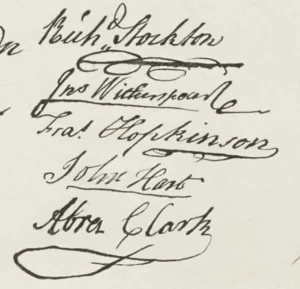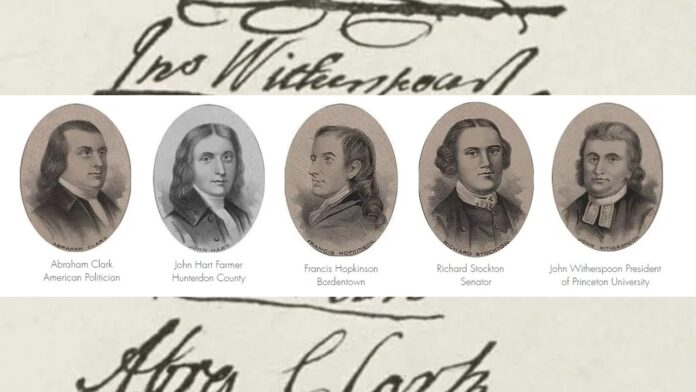The Five
It was an eclectic group of five who put their signatures on the line in 1776 for New Jersey. There was a judge, a farmer, a clergyman, a lawyer, and a justice of the peace.
The five New Jersey signers of the Declaration of Independence are Richard Stockton, the first in the state to sign the Declaration, Abraham Clark, Francis Hopkinson, Jonathon Witherspoon, and John Hart.
The Five …
The Five who “We Mutually Pledge To Each Other Our Lives, Our Fortunes, And Our Sacred Honor.”
The Five … Gutsy words in uncertain times …

Clark was a farmer, surveyor and politician who spent most of his life in public service. After signing the Declaration, he served two terms in the United States Congress until his death in 1794 and opposed the US Constitution until it included the Bill of Rights.
John Hart, also a farmer, was also a justice of the peace and a New Jersey Assemblyman while it was still a colony. He had his property destroyed by the British during the Revolutionary War, and his wife died three months after the adoption of the Declaration of Independence. He was twice elected to Congress before he died at age 66 in 1779.
Francis Hopkinson was a judge and lawyer by profession but also was a musician, poet and artist, becoming after the revolution one of the most respected writers in the country. He was an appointed Judge to the U.S. Court for the District of Pennsylvania in 1790.
Richard Stockton was trained to be a lawyer and graduated from the College of New Jersey, later known as Princeton. He was elected to the Continental Congress in 1776 and in November, months after the signing, he was captured by the British and was released in 1777 in very poor physical condition. His home at Morven was destroyed by the British during the war and he died in 1781 at the age of 50.
John Witherspoon was the only active clergyman among all 56 of the signers of the Declaration of Independence. He was elected to the Continental Congress from 1776-1782, elected to the state legislature in New Jersey from 1783-1789. He was also the president of the College of New Jersey from 1768-1792.




